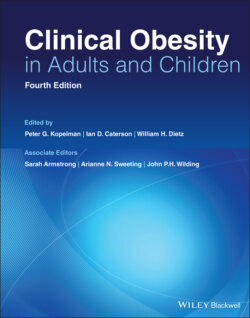Читать книгу Clinical Obesity in Adults and Children - Группа авторов - Страница 98
Discrimination
ОглавлениеWeight‐based discrimination affects health through direct and indirect pathways. As with any other form of discrimination (e.g. due to race/ethnicity), disparities in education, employment, and wages hinder socioeconomic advancement. Poor health is consistently associated with socioeconomic status, in part due to the lack of resources and increased stress that accompany financial hardship [15,63]. In sum, weight‐based discrimination leads to losses of socioeconomic opportunities and advancement, which consequently increase stress and impair health [15].
The stress of anticipated and perceived weight discrimination affects those with a higher weight through direct pathways as well. The process of “identity threat” leads people with stigmatized identities (in this case, individuals with obesity) to be on heightened alert for the possibility of rejection or discrimination due to their identity [64]. This state of hypervigilance can activate the hypothalamus‐pituitary‐adrenal (HPA) axis, the body’s stress response system [64,65]. Release of stress hormones (such as cortisol) by the HPA axis can lead to changes in appetite and, if activated repeatedly over time, this can contribute to weight gain, chronic inflammation, and disease [65]. Already well‐established in the broader discrimination literature [66], recent studies have increasingly found support for identity threat processes and stress in relation to weight discrimination. In large‐scale, observational studies, perceived weight discrimination has been found to be associated with greater self‐reported stress, as well as biological markers of stress and inflammation such as cortisol and C‐reactive protein [67–69].
Laboratory‐based experimental studies that manipulate exposure to weight‐stigmatizing scenarios (through the threat of interpersonal discrimination, reading news stories about weight discrimination, and viewing stigmatizing media portrayals of obesity) have also found acute effects on cortisol, blood pressure, self‐reported stress, and caloric consumption among adults with overweight/obesity [70–73]. For example, a study of 110 undergraduate women randomly assigned participants to a shopping paradigm in which they were either told that they could not participate in shopping because the study was full, or because the clothes were not in their size (i.e. weight discrimination; [74]). Measures of salivary cortisol were taken before and 30 minutes after this manipulation. Results showed that participants who perceived themselves as overweight had higher sustained cortisol levels in the discrimination condition compared to those in the control condition (this effect was not observed among participants who did not perceive themselves as overweight). Although confined to the laboratory, findings from this and similar studies suggest that people may experience a biochemical stress response when facing real‐world instances of weight discrimination.
This stigma‐related stress response may explain many of the observed associations between weight discrimination and adverse health outcomes. Data from over 22,000 adults with overweight/obesity in the National Epidemiologic Survey of Alcohol and Related Conditions showed associations between perceived weight discrimination and increased prevalence of depression, anxiety, and substance use disorders, even after controlling for general stress and other related health factors [75]. In addition to the mental health correlates of perceived discrimination [76], cross‐sectional associations have been documented with disordered or unhealthy eating behaviors, reduced physical activity, impaired sleep and cognitive abilities, poorer management of type 2 diabetes, and greater prevalence of chronic diseases (such as cardiovascular disease and diabetes; [4,77–82]). Data from several large epidemiological datasets have also shown longitudinal associations between weight discrimination and weight gain over time [83,84]. This latter finding is particularly important because it directly contradicts and common misconception that weight stigma motivates weight loss [85].
Recent studies have provided particularly powerful evidence of the physical health harms associated with weight discrimination over time. A study of 3609 older adults in the UK examined associations among obesity, weight discrimination (measured with the Everyday Discrimination Scale), and a physiological dysregulation index that included blood pressure, cholesterol, triglycerides, glucose, hemoglobin A1c, C‐reactive protein, and white blood cell count [86]. Controlling for demographics, medications, depression, and health conditions, results showed that weight discrimination accounted for 27% of the variance in the relationship between obesity at baseline and physiological dysregulation 4 years later. The authors noted that only the composite index score, but not individual biomarkers, were associated with weight discrimination, highlighting the need for further understanding of specific mechanisms. A similar result was found in a study of over 900 adults in the MIDUS Survey, in which perceived weight discrimination was associated with greater overall allostatic load 10 years later, and specifically with higher levels of lipids, glucose, and inflammatory markers [87]. In addition, one study found that in two separate population samples, perceived weight discrimination was associated with an increased risk of mortality 4–10 years later after controlling for a number of relevant health factors [88]. Altogether, the emerging, robust associations between perceived weight discrimination and physical health warrant careful consideration and further exploration of mechanisms and potential interventions.
Weight discrimination has a unique impact on health in the context of health care settings. The stress of anticipating disrespectful treatment or criticism from health care providers leads individuals with obesity (especially women) to report avoidance of health care visits and of preventive health services [32,89]. Avoiding or delaying health care utilization may reduce the likelihood of detecting preventable diseases early and increase the risk for exacerbation of current health problems [28]. As described earlier, weight bias among physicians affects the quality of care delivered to patients with obesity. For example, if a provider dismisses a patient’s presenting health issue as entirely due to weight, underlying health problems may be overlooked and untreated [28]. Denial of care due to BMI (such as being ineligible for certain surgical procedures) can also contribute to impaired health‐related quality of life. Finally, as previously noted, limited insurance coverage of obesity‐related treatments prevents individuals from benefitting from evidence‐based interventions that reduce cardiovascular and metabolic disease risk [39].
